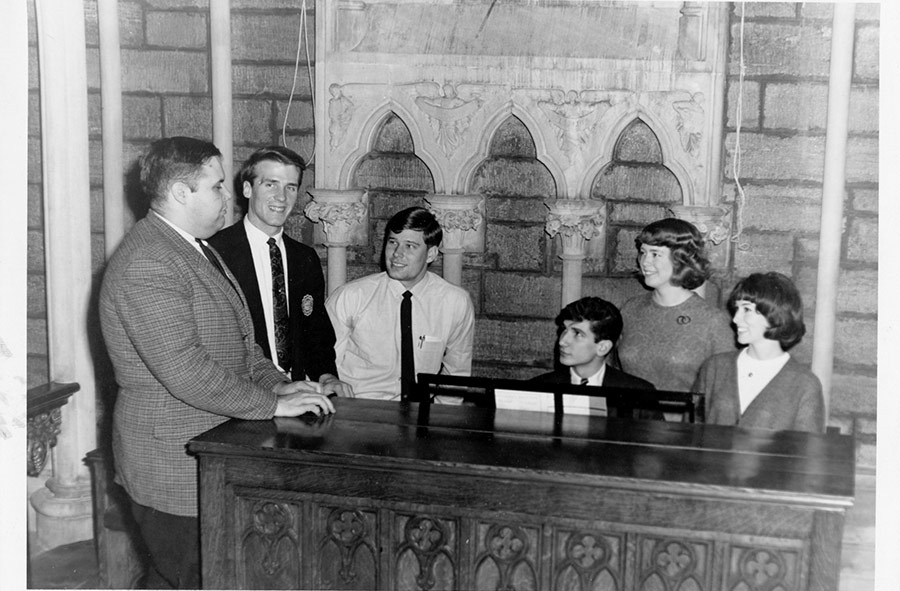The Historical Society of Pennsylvania will examine the role of music and religion in the life of Dr. John Fryer, an important local gay-rights activist, in a program called “The (Musical) Spark in My Life.”
The program, part of an ongoing series called “Memories and Melodies,” takes place March 31 at the Historical Society of Pennsylvania, 1300 Locust St. It begins at 6:30 p.m.; admission is $15 for nonmembers.
Fryer was instrumental in prompting the American Psychiatric Association to stop classifying homosexuality as a mental illness, but he also had a lifelong passion for sacred music.
This event includes a conversation between Rebecca T. Alpert, a professor of religion at Temple University who knew Fryer, and Ain Gordon, an artist-in-residence at HSP. Gordon is writing a play inspired by Fryer’s papers, which are part of the HSP collection.
In addition, members of the Arch Street United Methodist Church Choir will perform and Dr. Bruce Dorsey, a professor of history at Swarthmore College, will receive an award from the LGBT Religious Archives Network.
Fryer, who died in 2003, is primarily remembered for a courageous speech he gave at the 1972 convention of the APA. At that time, the APA considered homosexuality a mental disorder.
For a panel discussion, Fryer donned a mask and electronically altered his voice to appear as “Dr. Henry Anonymous.” Taking the microphone, he announced, “I am a homosexual. I am a psychiatrist. I, like most of you in this room, am a member of the APA, and am proud of that membership.”
The audience was spellbound. The majority of Fryer’s colleagues were not used to hearing homosexuals, including their peers, speak openly and confidently about their sexual identity.
“The fact that John had to put that paper bag over his head says everything about what the world was like in 1972 for gay people,” said Alpert, who is an LGBT scholar.
The effect of Fryer’s speech was galvanizing. Roughly one year later, the APA removed homosexuality from the Diagnostic and Statistical Manual of Mental Disorders.
The implications were momentous.
“It really literally changed our world,” Alpert said. The effect of that change, she continued, enabled “people like me and other gay people who were alive at the time to think, Yes, I am not diagnosable. I am a human being. And this is not a psychiatric condition; it’s a human condition.”
After appearing as “Dr. Anonymous,” Fryer went on to have a long and distinguished career as a psychiatrist at Temple University and in private practice. He also helped found the Philadelphia AIDS Task Force.
But there was far more to Fryer than just his work. As the longtime organist and choirmaster at St. Peter’s Episcopal Church in Germantown, he had a positive influence among his fellow believers, especially from the late 1960s through the 1970s.
That was a contested time for religious organizations, according to Alpert, who is also a rabbi. The church, like society at large, was undergoing major changes. Even liberal denominations were not as welcoming to women, people of color or LGBT people as one would hope.
However, Alpert noted, it is also important to recognize that our contemporary perceptions don’t quite match the historical reality. “There wasn’t really this cultural assumption we have that the church and the synagogue, that religious organizations, were really antigay,” she said. “John’s life really disproves that in a lot of ways.”
In fact, Fryer’s faith and the community he found at St. Peter’s were vital to him. It is no surprise, therefore, to learn that he tried to improve his church in much the same way that he tried to reform the APA. And he was largely successful.
“John was a major force in the local church to get them to realize that they had to change their patterns and practices and open up more to people who were different,” Alpert said.
Fryer’s influence continues to be felt today. His papers, which were donated to HSP by his sister, are available to visitors, scholars and artists, like Alpert’s interlocutor, Gordon.
An Obie Award-winning playwright, Gordon is currently involved in a two-year project at HSP called “An Artist Embedded,” which explores the intersection of history and fiction.
Inspired by Fryer’s collected papers, Gordon has been working on a new play called the “217 Boxes of Dr. Henry Anonymous,” which is scheduled to premiere in May at the Painted Bride Art Center. On this evening, the playwright will treat attendees to a brief preview.
All in all, it’s a fitting tribute to Fryer, a man of integrity who improved the lives of untold numbers of people.
To learn more about “The (Musical) Spark in My Life,” visit www.hsp.org/calendar.

